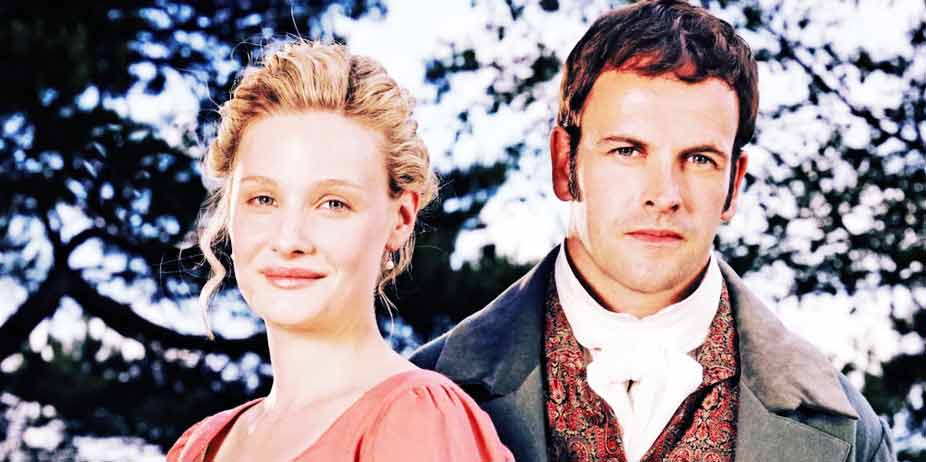
Emma (2009)
Jane Austen wrote Emma Woodhouse as an unlikable heroine who meddles in the affairs of her friends and has the grievous flaw of being far too “vain” about her influence for her own good. Her faults are larger than life in the brand-new miniseries by the BBC, but in the end all comes about as it should have had not Emma intervened.
During a bout of illness in the winter season, three deaths transpire that forever link semi-orphaned children. The first and most adored child is little Emma Woodhouse, the daughter of an eccentric but well-meaning nobleman (Michael Gambon). The second is sad Frank Churchill, who is sent to live with his aunt in another county, and the third is the unfortunate Jane Fairfax, the niece of the overly talkative Miss Bates. Emma witnesses Jane’s departure to live with relatives in a carriage, as she is being pulled along the road by her governess, Miss Taylor (May). Many years later, Jane Fairfax is still the apple of her aunt’s eye and Emma (Romola Garai) loathes that she hears of nothing else on the woman’s frequent visits. Jane sounds wonderfully accomplished in all manner of things, from painting and speaking different languages to the number of books she is determined to read.
But there is one thing Emma excels in that Jane does not: matchmaking. Her first successful match is between her older sister Isabella and John Knightley. At the wedding, after having boasted of her success to the younger George Knightley (Johnny Lee Miller), she casts her eye around for the next romantic prospect – and not long thereafter has married off her governess to a local widower. Not realizing how much the absence of Miss Taylor (May) would contribute to her loneliness, Emma takes under her wing the impressionable Harriet (Louise Dylan), who is the “natural” (illegitimate) daughter of “nobody knows whom.” Harriet is quite in love with a local farmer but Emma does not find him at all suitable and so attempts to interest the local cleric, Mr. Elton (Bake Ritson) in her friend. Little does she realize what harm she may do, harm that might threaten her precarious friendship with Mr. Knightley.
I was almost determined to dislike this production from the start, since for as long as I can remember, the Miramax adaptation with Jeremy Northam and Gwyneth Paltrow in it has been a favorite. Choosing to put aside prejudice, I discovered a delightful adaptation of a rather “difficult” novel (difficult due to its outrageous, vain and often horribly rude heroine). The charming introduction of the audience to the primary characters, the manner in which more than Emma’s life is explored (we also see scenes with her sister, at Mr. Knightley’s home, between the Bates and Harriet, and more of Jane Fairfax), and the wonderful cast more than make up for its relatively minor faults. Romola is quite good at undertaking troublesome roles and making her character likable in spite of her dreadful manners and here has a great supporting cast and the added benefit of a good script. One cannot help but laugh over Mr. Woodhouse’s laments on how dreadful cake is and how bad it is for children and how it should never be served at weddings one moment, and bury their head in the hands in the next as Emma makes painful errors in judgment.
This time around, everyone looks the part. The heroine and her friends are all young enough in appearance to be convincing (one flaw in my favorite version that I am willing to admit to), the men all have a decent screen presence, and no one feels atrociously out of place. I liked the cast, even though most of them were unknowns. I will say one thing and that is while Miller is good as Mr. Knightley, he simply cannot fill the shoes Jeremy Northam left behind. I realize that is a minor complaint at best and entirely based on personal opinion, but the part seemed a little too “mature” for such a young actor to undertake. He doesn’t seem that much older than Emma, which makes the occasions in which he contradicts or “scolds” her somewhat difficult to navigate. However, I realize that mine is not the standing opinion and indeed, most of my friends liked him very much. This is also the only adaptation in which the story completely makes sense. Frank is flirty, Emma's behavior at times intolerable, and reasons are given for her few genuine mistakes. For example, she so often badmouths Miss Bates behind her back that her insult at the picnic seems a genuine mistake -- which it was.
For once, they also showcase the difficulties in Emma’s situation – her loneliness, her desire to go on trips but being prevented from doing so by her hypochondriac father, and her frustration at not having friends around her own age. Her mollification at Frank’s behavior at the picnic is also brought out, and her shame in how she treated Miss Bates is magnified. The rest of the characters are equally good, and the screenwriter has done a good job with the adaptation. My only complaint is that at times it isn’t as romantic as some of the other films in the genre and the proposal feels a little anti-climatic. There are also some modern mannerisms that might frustrate viewers, but they never distracted me from the film.
Sadly, the BBC has decided to forgo most new costume dramas and so this may be our last great adaptation for awhile. I am sorry for that, as the autumn arrival of the usual slew of “bonnet pieces” has been a staple of mine since childhood, and Emma is another classic to add to the list.
